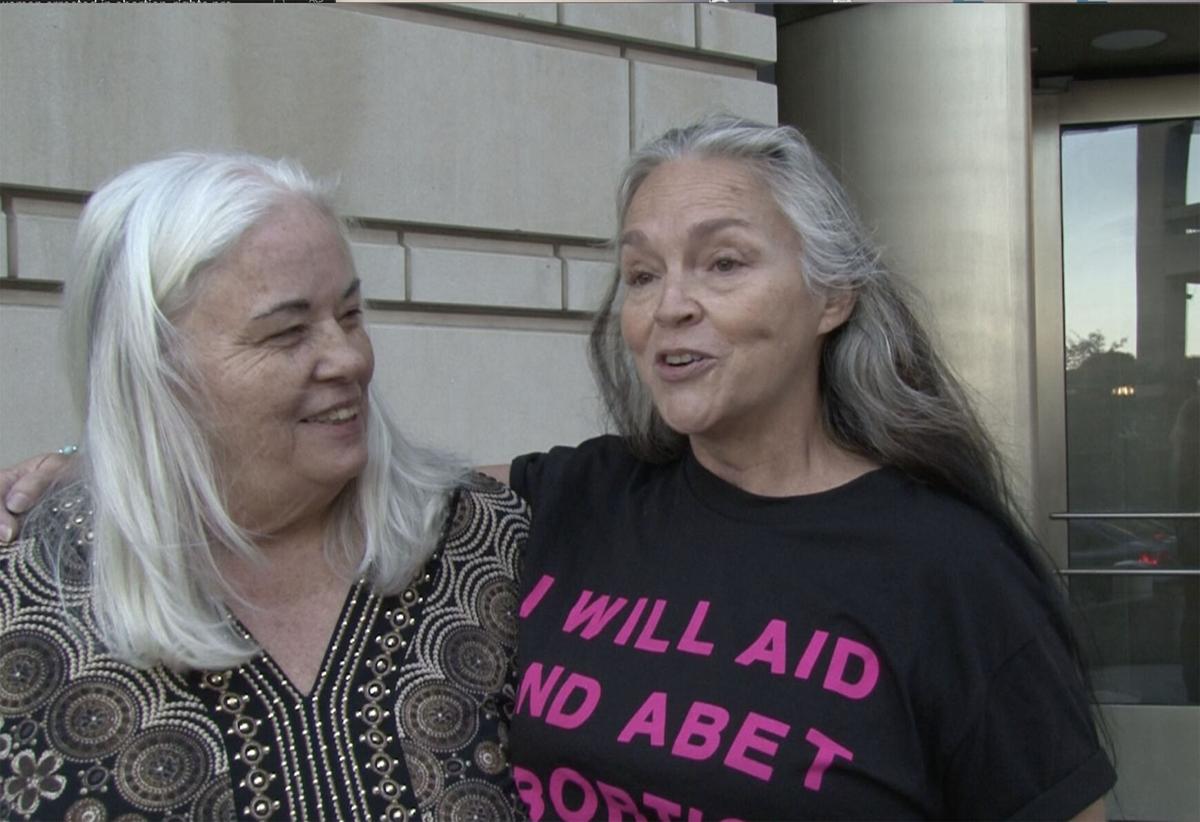A Tucson woman was one of three people arrested Wednesday after they disrupted a Supreme Court hearing with a protest over the court’s decision to reverse its 1973 ruling that had recognized a right to an abortion.
Rolande Baker said the protest, which momentarily halted arguments in an unrelated banking case, was timed to fall right before the elections so that women and abortion-rights activists would be moved to express their anger at the ballot box.
“Things must change in Arizona,” said Carla Roberts, a friend and fellow activist from Tucson who greeted Baker after she was released from federal custody Thursday. “That’s why we flew all the way here from Arizona. to make sure that women in Arizona know that we must stand together, and we must fight.”
Baker was in the court Wednesday along with Emily Paterson and Nikki Enfield, both from Virginia, for arguments in Bittner v. United States, a case that asks how often bank regulators can apply penalties for failure to file required reports on foreign accounts under the Bank Secrecy Act.
Attorney Daniel Geyser had barely started speaking before he was interrupted by one of the women, who a witness in the court said stood up and urged American women to denounce the court’s abortion ruling in Dobbs v. Jackson Women’s Health, which overturned Roe v. Wade, and to remember to vote.
She did not resist as she was then quickly and quietly escorted from the courtroom by police.
Geyser started again but was interrupted less than a minute later by Baker. She said Thursday that she got up from her seat in the public section of the court and said, “Our rights must not be served. Vote pro-choice, just vote,” before she, too, was escorted from the court.
Before the first minute of arguments was done, the third protester had stood up and said her piece.
Amy Howe, a reporter for the SCOTUSblog website who was in the courtroom, said that after they spoke, all three women held out their wrists as if to be handcuffed, and each was lead peacefully from the courtroom by police.
All three were charged with “uttering loud, threatening or abusive language in the Supreme Court” and “demonstrating with the intent of interfering with the administration of justice or with the intent of influencing a judge in the discharge of his or her duty,” according to a statement from the court’s press office. They were held overnight in the D.C. Central Detention Facility and appeared Thursday afternoon in U.S. District Court before being released.
Even though it was peaceful, Howe called the protest “surprising” for the court, which rarely sees any sort of emotional display. The last time there were protests in the court building was 2015, protests that Howe said were not nearly as peaceful as Wednesday’s.
“That was very different because there were more protesters and they did not go easily,” Howe said. “The police really had to sort of grab them and pull them out.”
By contrast, Howe said Wednesday’s interruption barely disrupted the proceedings. “Geyser just kept speaking,” she said. “The justices did not acknowledge the interruption.”
The women’s statements were edited out of the audio recording of the arguments, and the transcript merely says “(Interruption)” in place of their actual words. Two of the protesters can barely be heard on a C-SPAN recording of the proceedings, but their statements are almost impossible to make out.
Even though their statements were edited out of the official court record, Baker said she still thinks the message got across.
“They (Supreme Court) don’t want it to be said,” Baker said outside the U.S. District Court Thursday evening. “They don’t want it to be told. They don’t want our voice to be heard, but we know.”
For Baker, a retired schoolteacher and great-grandmother, this was not her first arrest while protesting. She said her protesting days began during the Vietnam war, but that this issue hit close to home for her and friend, Roberts. That’s why they hope the protest will encourage people to vote.
“If you haven’t voted, vote, and when you vote, it’s blue all the way down the ballot,” she said.
Congressional District 7 candidates Luis Pozzolo and Raúl Grijalva discuss abortion access. Video by Jesse Tellez / Arizona Daily Star.
Legislative District 18 candidates Stan Caine, Priya Sundareshan, Nancy Gutierrez and Chris Mathis discuss abortion access. Video by Jesse Tellez / Arizona Daily Star.
Congressional District 6 candidates Kirsten Engel and Juan Ciscomani on abortion access. Video by Andrea Morabito For the Arizona Daily Star.
Legislative District 17 candidates Brian Radford, Dana Allmond and Mike Nickerson discuss abortion access. Video by Pascal Albright / Arizona Daily Star.
Legislative District 18 candidates Stan Caine, Priya Sundareshan, Nancy Gutierrez and Chris Mathis discuss abortion access. Video by Jesse Tellez / Arizona Daily Star.





